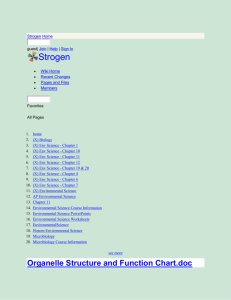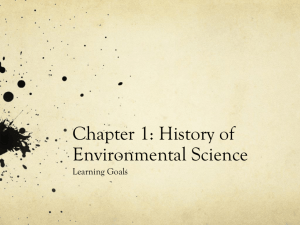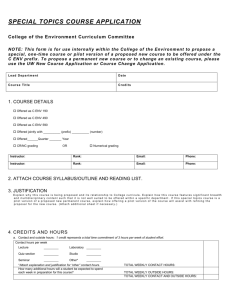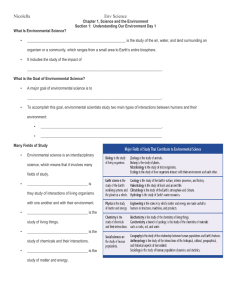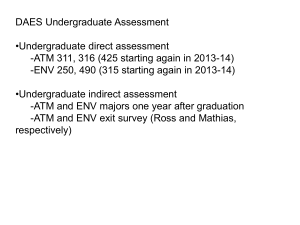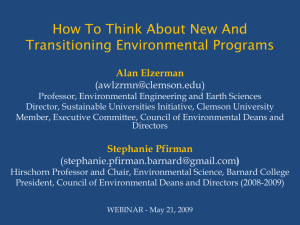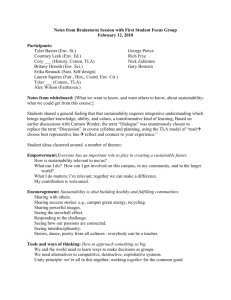Program under review: Environmental Studies
advertisement
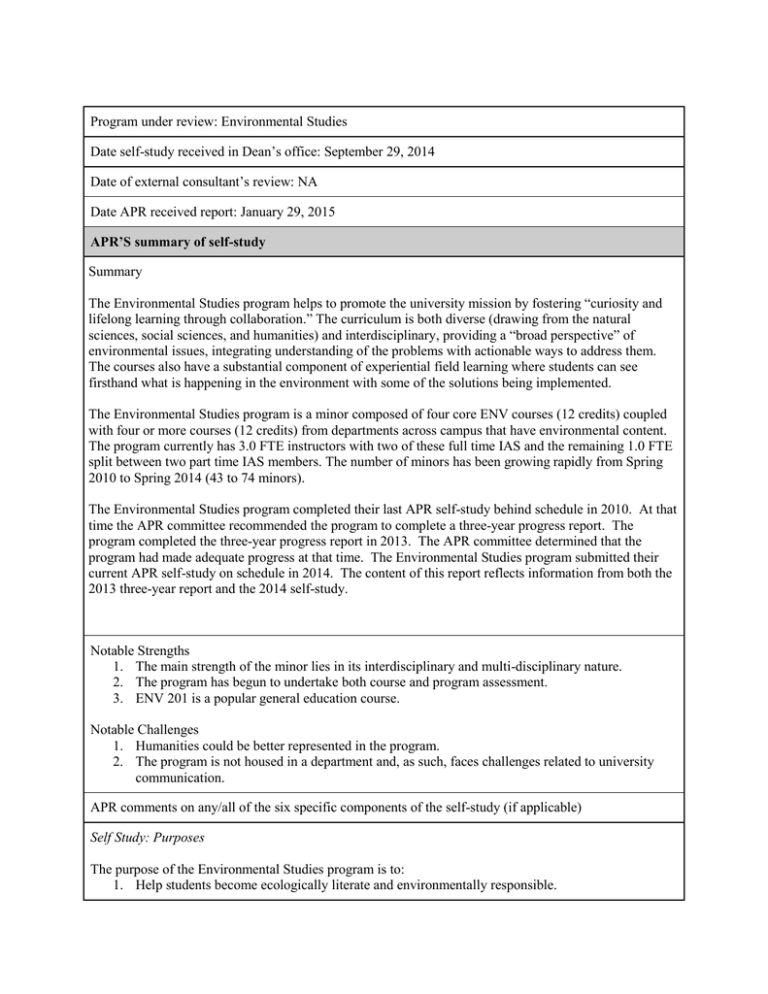
Program under review: Environmental Studies Date self-study received in Dean’s office: September 29, 2014 Date of external consultant’s review: NA Date APR received report: January 29, 2015 APR’S summary of self-study Summary The Environmental Studies program helps to promote the university mission by fostering “curiosity and lifelong learning through collaboration.” The curriculum is both diverse (drawing from the natural sciences, social sciences, and humanities) and interdisciplinary, providing a “broad perspective” of environmental issues, integrating understanding of the problems with actionable ways to address them. The courses also have a substantial component of experiential field learning where students can see firsthand what is happening in the environment with some of the solutions being implemented. The Environmental Studies program is a minor composed of four core ENV courses (12 credits) coupled with four or more courses (12 credits) from departments across campus that have environmental content. The program currently has 3.0 FTE instructors with two of these full time IAS and the remaining 1.0 FTE split between two part time IAS members. The number of minors has been growing rapidly from Spring 2010 to Spring 2014 (43 to 74 minors). The Environmental Studies program completed their last APR self-study behind schedule in 2010. At that time the APR committee recommended the program to complete a three-year progress report. The program completed the three-year progress report in 2013. The APR committee determined that the program had made adequate progress at that time. The Environmental Studies program submitted their current APR self-study on schedule in 2014. The content of this report reflects information from both the 2013 three-year report and the 2014 self-study. Notable Strengths 1. The main strength of the minor lies in its interdisciplinary and multi-disciplinary nature. 2. The program has begun to undertake both course and program assessment. 3. ENV 201 is a popular general education course. Notable Challenges 1. Humanities could be better represented in the program. 2. The program is not housed in a department and, as such, faces challenges related to university communication. APR comments on any/all of the six specific components of the self-study (if applicable) Self Study: Purposes The purpose of the Environmental Studies program is to: 1. Help students become ecologically literate and environmentally responsible. 2. Expand career opportunities of students in environmentally related fields. 3. Increase students’ knowledge and skills to live as responsible global citizens. 4. Help students gain a rich and diverse background covering many disciplines from an environmental perspective. The Environmental Studies program has three SLOs for students who complete the minor: 1. Students will gain an interdisciplinary and multi-disciplinary view of environmental issues. 2. Students will gain an understanding of historical and ongoing efforts to protect the environment and their degrees of success. 3. Students will acquire the necessary skills and understanding to make informed decisions about the environment and to realize how those decisions impact others. Self Study: Curriculum The minor is composed of four core ENV courses (12 credits) coupled with four or more courses (12 credits) from departments across campus that have environmental content. The minor has two goals: (1) Give students a broad perspective to environmental issues and problems through our ENV courses; and (2) Give students an in-depth look at environmental issues from a particular disciplinary perspective in each of the three major categories: Humanities, Natural Science, and Social Science. Through the structure of the minor and the courses taken, students gain an interdisciplinary (in ENV courses) and multi-disciplinary (through the courses in the disciplines) view of environmental issues. Student learning objectives #2 and #3 of the program are primarily met through the ENV core courses. Students must take each of the following core courses: ENV 201 Introduction to Environmental Studies (3 cr.) ENV 301 Environmental Sustainability (3 cr.) ENV 303 Issues in Environmental Studies (3 cr.) [topic changes each semester] ENV 496 Integrative Seminar (3 cr.) Self Study: Assessment of Student Learning & Degree of Program Success The Environmental Studies program worked with the university assessment coordinator, Patrick Barlow, to develop programmatic learning outcomes, as reported in the 2013 three-year progress report. They began to assess those outcomes in ENV 496 during the 2013-1014 academic year. The 2014 self-study includes results from their first year of assessment. The program has also recently began to assess general education student learning outcomes in ENV 201. In Spring 2014 the program assessed SLO #3: “Students will acquire the necessary skills and understanding to make informed decisions about the environment and to realize how those decisions impact others.” Out of 19 minors, 15 scored “exemplary,” two “proficient,” one “competent,” and one “underdeveloped” on the program assessment instrument. Additional information/feedback on the minor is gathered from the students in ENV 496 at the end of the semester, which takes the form of an informal assessment of the minor. A total of 15 students reported that they would like to see an ENV major offered at UW-L. Major strides have been made in assessment since the last APR review. The program should continue the assessment process, in consultation with Patrick Barlow and the CLS Assessment Committee, to reflect on how assessment data can be gathered and used to make programmatic improvements. Self Study: Previous Academic Program Review and New Program Initiatives The program addressed each of the previous recommendations in a three- year progress report submitted in Spring 2013. In this report, they addressed each of the major recommendations of the APR committee, including: Developing general education assessment for ENV 201 o The environmental studies program has complied with general education assessment requirements for ENV 201. Creating a content grid for ENV 201 to ensure consistency o The environmental studies program have developed the content grid for ENV 201 that all instructors follow to insure continuity among sections. This grid represents about 70% of the content of the course, with the balance left up to instructor interests/expertise/current issues. Creating Program Goals and Student Learning Outcomes for the minor o Environmental Studies Program Goals Give students an interdisciplinary and multi-disciplinary view of environmental issues. Present students with historical and ongoing efforts to protect the environment and their degrees of success, thus preparing them for environmental responsibility. Give students the necessary skills and understanding to make informed decisions about the environment and to realize how those decisions impact others. Give students active/service learning experiences to gain knowledge and experience with turning ideas into action. o Environmental Studies Program Student Learning Outcomes Students will gain an interdisciplinary and multi-disciplinary view of environmental issues. Students will gain an understanding of historical and ongoing efforts to protect the environment and their degrees of success. Students will acquire the necessary skills and understanding to make informed decisions about the environment and to realize how those decisions impact others. Aligning curriculum with Program Goals o The courses ENV offer and those that count toward the minor are chosen to meet the program goals and student learning outcomes. The program currently offers 17 sections of ENV 201 per year, one section of ENV 303 per semester, and one section of ENV 496 in the spring each year. With the substantial growth in the environmental studies minor, the demand for ENV courses has only increased since the last program review. The program may need to expand the offerings in the near future to keep up with demand. In addition, the program is currently studying expanding the breadth of offerings under the ENV designation, and possibly relying less on electives from other departments, since these have been unreliable in some areas. Beginning assessment of Student Learning Outcomes o None at the time of the three-year progress report. However, in Spring 2014 the program assessed SLO #3: Students will acquire the necessary skills and understanding to make informed decisions about the environment and to realize how those decisions impact others. Consulting with our campus-wide environmental initiatives o The Environmental Studies program director consulted with faculty members involved in proposing the “Sustainable Business” minor in CBA. This was also discussed with members of the Joint Committee on Environmental Sustainability. The faculty members from CBA did not consider the Environmental Studies minor a good option for their students. In addition, in accordance with previous APR recommendations, Environmental Studies was given an office space in Centennial Hall and the Director was given a 0.25 FTE release. Self Study: Personnel The program currently has 3.0 FTE instructors. There are two full-time IAS in the Environmental Studies Program including: Dr. Alysa Remsburg who holds a Ph.D. in ecology and Dr. Shannon Amberg, who holds a Ph.D. in natural resources with an emphasis in conservation social sciences and an undergraduate degree in environmental studies. The program also has two part-time IAS members: Mr. Buzz Bocher has a master’s degree in outdoor education; and Mr. Scott Lee who is an adjunct instructor with a master’s degree in education specializing in environmental education. Self Study: Support for Achieving Academic Program Goals (Resources) Physical Facilities The self-study noted that the physical facilities were adequate for the time being. There would be a need for increased office space, however, if the programs seeks to grow and become a major. Supplies and Equipment Supplies and equipment are adequate at this time. Personnel With future retirements of the part time instructors, the program anticipates hiring a third full-time instructor whose area of expertise will complement that of existing instructors. Adding one or more tenure track positions in the long term would be beneficial for the program. External Funding NA External Reviewer Recommendations APR’s Comments on External Reviewer (if applicable) NA Department’s response to the Reviewer Recommendations APR’s Comments on the Department’s Response (if applicable) NA Dean’s Letter APR’s Comments on Dean’s Letter (if applicable) APR agrees with the areas of concern noted in the Dean’s letter. Both the current Dean of Liberal Studies and the current Director of Environmental Studies Program are vacating their roles at the end of this academic year. It will be important that the next Dean and next Director work together to continue addressing challenges currently in the minor and possibly expanding into a major. These challenges include: 1. That Humanities could be better represented in the program. 2. Inclusion of the ENV Director in chairs meeting and officially receiving university communications. 3. Increased travel funds for “research-active,” full-time IAS. 4. In order to become a major, the program would need additional tenure-track faculty positions, increase in budget and office space, and authorization to become a stand-alone department or housed within a joint department. APR’s Recommendations (must be completed) Recommendations: 1. The program should continue to assess their newly developed SLOs in consultation with Patrick Barlow and CLS Assessment Committee. 2. The program should work to clarify and align the mission, purpose, goals, and student learning outcomes. 3. Solicit course ideas from departments in the humanities. 4. Work with other department on course offerings. 5. The program should explore and develop their long-term strategic plans. □ No serious areas to address – review in next regularly scheduled cycle □ Some areas to address – review in next regularly scheduled cycle X Some areas to address – department should submit short report on progress to Faculty Senate/Provost’s Office in 3 years. While we applaud the strides made by the program over the past two years, we recommend the department provide an update on the progress of their programmatic assessment and alignment of their goals and students learning outcomes. This is especially important given the transition in both the director position and in the CLS Dean’s office.
